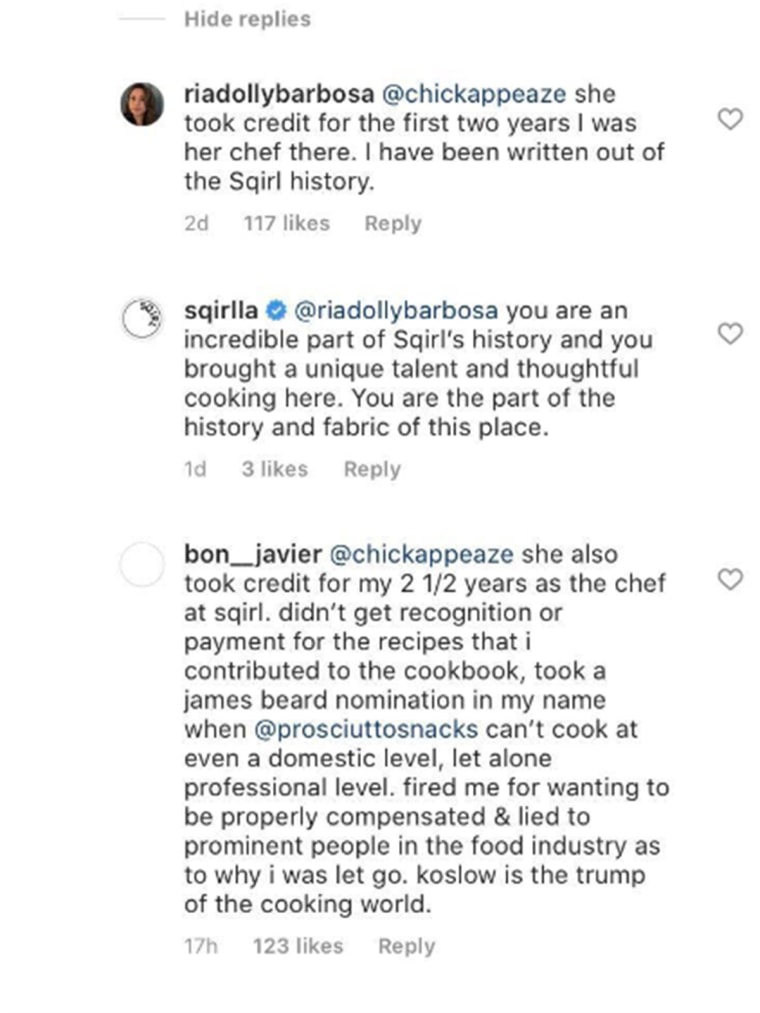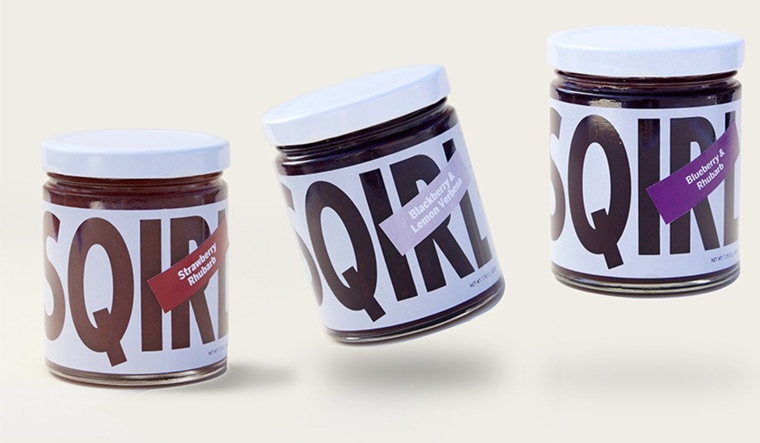Los Angeles restaurant Sqirl, which is known for its upscale brunch plates and signature jams, has found itself at the center of another recent food world controversy after a series of Instagram stories and comments accused the eatery's owner of not crediting workers of color, forcing employees to work in unsafe conditions and, perhaps most shocking to diehard fans Sqirl fans, serving jam that once been covered in mold.
Sqirl, located in East Hollywood, opened in 2012 and quickly drew long lines after several noteworthy reviews. Until March when COVID-19 forced restaurants to closed, owner Jessica Koslow, known for her expertise on eclectic-flavored preserves, had served breakfast and lunch fare, including dishes like a $22 sorrel-pesto rice bowl, cactus flour pancakes and $9 brioche toast smeared with house-made jam and ricotta.
The restaurant's minimalist space is situated on a small corner of Los Angeles known as Virgil Village — an area that, unlike its neighbors to the east and west (Silver Lake and Venice Beach), had remained mostly untouched by expensive juice shops and restaurants serving pricier plates (i.e. gentrification) — until Sqirl set up shop.
Yet, as Koslow swiftly became a food world darling, she also received criticism for profiting off of food that touted sustainability, but was hardly an affordable option for many residents in Virgil's community.
In a 2016 Eater profile, Koslow and chef Ari Taymor, who also opened a much-hyped Los Angeles eatery called Alma in 2012, discussed finding the "cheat" to making money as a business owner without sacrificing too much integrity as a chef. For Koslow, it was charging premium prices for food while renting a cheap space.
"My cheat is this s----y corner on Virgil and Marathon. The cheat is, like, I pay $2 per square foot," Koslow said at the time.
Despite making a dig at her own restaurant's community, Koslow's star continued to rise. The New York Times called Sqirl's food "downright revolutionary" in a 2015 review that opened with, "It all started with the jam." Since 2018, she has been nominated for James Beard Awards and Sqirl's signature jams are available through several retailers.
Like the restaurant, the recent uproar about what really happens behind Sqirl's kitchen doors started with the jam.
On Saturday morning, self-proclaimed "food antagonist" Joe Rosenthal posted dozens of Instagram stories in his highlights titled: "The Fungal." Via Instagram, Rosenthal shared interviews with former and current Sqirl employees who claimed they were routinely asked to scrape thick layers of mold off of buckets filled with the eatery's jam. Many also claimed they had to work in unsafe and unsanitary conditions and also saw rats running around the kitchen (a representative for Sqirl and Koslow both vehemently denied that Sqirl has ever had a rodent problem).
"I won't post a story unless I have confirmation from multiple parties that there was like a quarter (of an) inch of mold being scraped off and that it was a regular thing," Rosenthal told TODAY Food.
Rosenthal is a mathematician and senior data scientist who works on developing artificial intelligence to improve cancer diagnostics. In his spare time, he creates recipes and investigates issues in the culinary industry. Most recently, he brought more details to light surrounding Bon Appetit's "toxic" work culture. He was inspired to investigate the allegations against Sqirl after seeing an account called @SqirlTruth, which is run by former and current restaurant employees.
"I have no investment in L.A. food and I've never been to Sqirl. I'm in Minnesota. Something drew me in to look more at it," Rosenthal said. "Mold is tangible evidence that something is wrong. I had questions: Why is there mold? And did Jessica know about the mold?"
Ria Dolly Barbosa, who signed on as Sqirl's chef de cuisine for its 2012 opening and worked there for two years, told TODAY she recalled finding mold in a container of jam in the kitchen.
"I opened one up once and there was a little mold there, so I asked if this bucket was no longer good. Jessica (Koslow) said I could just scrape it off. She had taken all the preserving classes, so I took what she said as sound advice," Barbosa said. However, the chef acknowledged that she "didn’t experience a mold (situation) on the level that it seems to be now," and credits that to the acceleration of jam production that has occurred over eight years.
Barbosa also confirmed the existence of a secondary prep kitchen that had no hood over the stove area for proper ventilation, despite telling Kolsow that one needed to be installed. "It would get really hot in there," the chef said.
In a statement provided to TODAY, Koslow apologized to customers and employees for knowingly removing mold from her jams and using an unregulated kitchen space in the bodega next door, which now serves as the space for her to-go business, Sqirl Away. When she acquired the space in 2013, Koslow was unable to get a bank loan to fund the renovation required to bring the kitchen up to code and said the "secondary kitchen fell off the radar of the Health Department" until 2018.
"Ashamedly, I took advantage of their (the Health Department's) oversight and did the best we could as we used Sqirl’s main kitchen for all our restaurant orders including jam, and used the secondary kitchen primarily for baking and food prep," Koslow said.
As for the jams, Koslow explained that while the same recipe is used for her jams sold at retail (which are pasteurized using a "hot pack" method) and her jams served at the Sqirl restaurant, the latter does not under go the same pasteurization process.
"Because the jam is low in sugar and we don’t use chemicals or preservatives there were occasional instances where mold would develop on the surface. When this happened we would remove it. To guide this practice I relied on the research and guidance of health experts and to my knowledge thought it was safe," Koslow stated.
Going forward, Koslow said, "Jam with mold will not be permitted in any of our kitchens or our restaurant."
According to the U.S. Food and Safety Inspection Service, spoilage organisms include yeast, fungi, mold or other bacteria and, though they may look unsightly, are unlikely to make someone violently ill.
"It's probably not the case that this is dangerous to general populations, but who knows what kind of effects this could have on some people. This is terrible for those with mold allergies," Rosenthal, who is working to have Sqirl's retail jams tested by a microbiology lab, said.
While Rosenthal's investigation began with the famous jam, it has brought up another issue platformed on the Sqirl Truth Instagram account. On the heels of the departure of Bon Appetit's editor-in-chief, Squirl Truth cited examples in which employees of color were not given credit for their work.
Sqirl's former chef de cuisine Javier Ramos called Koslow the "Trump of the cooking world."

"The fact that it took moldy jam for some of the hipsters to wake up ... She (Koslow) took credit for things that weren’t hers, gentrified the neighborhood, alienated people of color," the account posted.
Sqirl was Barbosa's first managerial gig as a chef de cuisine and she described having "stars in her eyes" when she was hired. Now, however, having left in 2014, she sees her experience in a different light.
"It was the time when chef-owner was hot title. I said (to Koslow), 'Hey listen, you're a great restauranteur, but you're not here creating all these specials, this food," Barbosa told TODAY, adding that even though she and Koslow collaborated on several recipes, she never received due credit and later moved to a different kitchen that would acknowledge her professional role.
"One of the things that made me want to sign on with Sqirl and open this space was (Jessica and I) had a convo as women who had been in kitchen experiencing the boys' clubs," Barbosa said. "We wanted to create a new environment where people were nice and respectful towards each other without the normal cut-throat, toxic nature that kitchens were known for. We didn’t wanna be that place."
But that ideal working environment, according to Barbosa, was relatively short lived.
"I told her, 'F--- yeah, let’s be the change!' To hear that it has degraded, it’s like, ah man, she became what she didn’t wanna be.”


